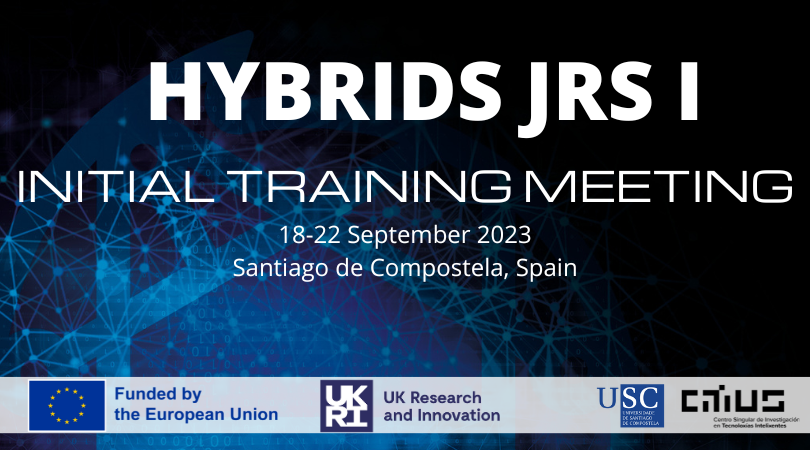By Irene Larraz, Newtral
The University of Santiago de Compostela will be the venue for the initial gatherings between supervisors and doctoral candidates who will conduct research in the field of hybrid artificial intelligence
The HYBRIDS project, which aims to equip researchers with the knowledge and tools necessary to tackle the challenges of hybrid artificial intelligence, is making continuous progress. Between September 18 and 22, an event will be held at the University of Santiago de Compostela, bringing together the 11 doctoral candidates and their supervisors for their inaugural meeting.
This initial interaction will serve to kickstart activities and the establishment of a network among the chosen participants, facilitating acquaintanceship within each subgroup and the commencement of their research endeavors.
On the first day, the HYBRIDS project will be introduced to all doctoral candidates, along with an overview of each distinct work package. Additionally, each candidate will deliver a presentation lasting between 10 and 15 minutes, addressing aspects such as the background of their research, the relevance of their idea to HYBRIDS, and the specific theme of their doctoral work.
The day will conclude with two courses. The first, conducted by Arkaitz Zubiaga, a supervisor and researcher at Queen Mary University of London, will focus on providing an introduction to the detection of fake news. The second workshop, centered on an introduction to hate speech, will be conducted by Sara Tonelli, a researcher at Fondazione Bruno Kessler.
Throughout September 19, César González-Pérez, the head of the Semantic Technologies and Cultural Heritage research line at the Institute of Heritage Sciences (Incipit, CSIC), will lead a course on discourse analysis methodology. Lastly, doctoral candidates will benefit from personalized mentorship provided by their respective supervisors.
A step forward in the HYBRIDS project
For the initial two days, the attendees will exclusively comprise the doctoral candidates and their supervisors. However, commencing from Wednesday the 20th, candidates from the doctoral network “Interactive Natural Language Technology for Explainable Artificial Intelligence” (NL4XAI) will join the event. This network aims to address the challenge of making artificial intelligence “self-explanatory,” thereby contributing to translating knowledge into products and services for economic and societal benefit. The network is also a participant in the European Union’s Horizon 2020 research and innovation program, operating under the framework of the Marie Skłodowska-Curie grant agreement.
On that day, the Galician Business-University Foundation (FEUGA) will deliver a conference on scientific communication—the second part of which will occur on the following day—and María Pacheco, researcher from the University of Colorado Boulder, will delve into the topic of neurosymbolic strategies. The schedule also includes tutorial sessions and a cultural visit to explore the heritage of the University of Santiago de Compostela.
On Thursday, the 21st, a roundtable discussion on the challenges posed by large-scale linguistic models will take place. The event will conclude on the final day with a course led by Martín Pereira, a Philosophy doctorate holder from USC, on corpus annotation, followed by a concluding discussion.
Through this gathering, the HYBRIDS project takes another stride forward, with the aim of promoting research in the realm of artificial intelligence applied to the identification of fake news, hate speech, and misinformation, among other pertinent topics.
Click here to view the event schedule.

